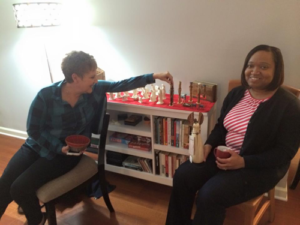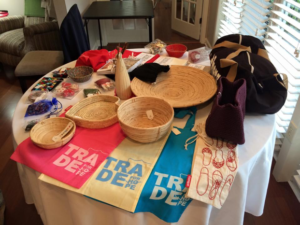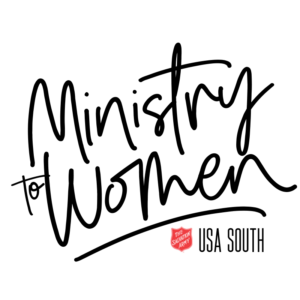

At Home with OTHERS
By Maureen Diffley
How often do we see that access to a living wage, non-exploitive work and humane conditions are considered a privilege and not a human right?
How often do we realize that when we purchase food, clothing and other goods we are likely participating in a story that starts with exploitation? Is that the story we want to tell?
 As a city dweller in a major US urban center (Atlanta), I am generally far removed from the beginnings of the things I use and the foods I eat. I live in a culture that promotes mindless and endless consumerism, but I worship a God who calls me to love the Lord with all my heart, soul and mind and my neighbor as myself. So I cannot shut off my mind or ignore the way my neighbor’s exploitation can benefit me. Well, I cannot if I want to worship the Lord in the way that I understand God wants to be worshipped.
As a city dweller in a major US urban center (Atlanta), I am generally far removed from the beginnings of the things I use and the foods I eat. I live in a culture that promotes mindless and endless consumerism, but I worship a God who calls me to love the Lord with all my heart, soul and mind and my neighbor as myself. So I cannot shut off my mind or ignore the way my neighbor’s exploitation can benefit me. Well, I cannot if I want to worship the Lord in the way that I understand God wants to be worshipped.
So, I have to give consideration to things like – how was this grown? How were the workers treated? How useful is this item really? What impact does the production and use of this item have on creation? And I make decisions. Because I am saturated in a stuff culture, there are things that I use that I haven’t thought a lot about. There are things I’ve bought hoping that the eco-friendly explanations are valid and the fair trade label isn’t compromised. Yet I make more and more decisions based on the information available to me to support clothing from companies that provide an explanation of their practices, tea that comes with a fair trade label and so on. And I appreciate when I’m told about possibilities I haven’t heard of or considered yet. It is not always easy to find such items. Since I move a lot, I always have to relearn where to get the locally grown items and find the fairly traded goods. In some places that has been easier to do than in others.
Yes, it costs more. Because it costs more to not exploit people.
It’s true that some of the brands that sell items certified as fair trade or humanely produced seem to have set their prices first based on a target customer group of trendy, bourgeois do-gooders. So it often takes some effort to find things for never-been-cool and not-got-a-lot-of-cash do-gooders like myself. Yet I have found options. And frankly, I would rather not buy something at all than decide I can only afford to buy the slave-made version.
Christ came to set the captives free. Should my consumerism bind people in captivity? Shouldn’t my Christian faith community exemplify an alternative culture – a culture of freedom from exploitation?
Too often, we find ourselves making, selling and buying things that won’t last too long. They were designed to break, to be discarded  and to be replaced. A lot of the stuff we buy is just a short time away from winding up in the garbage can. But it keeps the GDP up! Growth is based on garbage.
and to be replaced. A lot of the stuff we buy is just a short time away from winding up in the garbage can. But it keeps the GDP up! Growth is based on garbage.
Somehow, we have gotten in the habit of throwing away and forsaken treasuring. What if we treasured people? What if we made things so that we could treasure them (not worship them) for a long time?
The first time that I heard about The Salvation Army OTHERS brand, which does just this, was quite exciting for me. I was training to be an officer in Moscow and our leadership, the late Bo Brekke and his wife, now Commissioner Brigitte Brekke-Clifton, were telling us how they began this brand in Bangladesh. While women and girls who left brothels were rehabilitating, they were provided the opportunity to learn skills to earn money in a way that was not exploitive or unsafe. The Brekkes had overseen the expansion of the OTHERS brand to Pakistan and Kenya, and were keen to see it expand in Eastern Europe, where they were then second-in-command of The Salvation Army’s work. It was terrific for me to see up close the fine seamstress work and linens of Moldova become a part of the OTHERS brand.
OTHERS has focused on providing opportunities for destitute women, prostituted and trafficked women, widows and divorced women – who are particularly vulnerable to exploitation, to engage in honorable work as producers of high-quality goods. Most of the women producers in Bangladesh are the heads of their households and are now able to provide for their families’ basic needs, to send their children to school and to develop their businesses.
The Salvation Army’s direct trade brand provides fair rates directly to the producers. The goal is not to maximize profit, but to maximize justice. OTHERS represents a return to our Salvationist roots of addressing injustice as close to the cause as possible with ingenuity.
The OTHERS products really are things you can treasure. The items are unique, crafted to last and to serve a purpose. We carry things in bags, store money in wallets, put keys on chains and keep things in baskets. Yes, we decorate for special celebrations to remind ourselves that some times and places are special. So we put out a tablecloth, set out a Nativity set, and hang ornaments in a tree. We are going to do these things. Why not tell a good news story of moving from exploitation to freedom rather than a story of exploitation and cheapness?
 I am so pleased that prices for OTHERS Home Party products are not just for that invisible rich uncle, but that there is really a lovely item for every U.S. budget. Many items are in the $3.50 to $5 range. The most expensive item is $44 (for an excellent linen tablecloth). Most OTHERS products are available for $20 or less. This really encouraged me to host a home party because I felt comfortable that making a purchase would not be a burden for any of my guests, that they would get something they really liked and could use, and that we would all celebrate being part of a justice story together. I think we had a great time and we made well-considered purchases that tell a story of dignity and honor.
I am so pleased that prices for OTHERS Home Party products are not just for that invisible rich uncle, but that there is really a lovely item for every U.S. budget. Many items are in the $3.50 to $5 range. The most expensive item is $44 (for an excellent linen tablecloth). Most OTHERS products are available for $20 or less. This really encouraged me to host a home party because I felt comfortable that making a purchase would not be a burden for any of my guests, that they would get something they really liked and could use, and that we would all celebrate being part of a justice story together. I think we had a great time and we made well-considered purchases that tell a story of dignity and honor.
We often say that home is where the heart is. Why not share your heart for justice in your home by hosting an OTHERS home party?
Check out the party plan to see what it involves – At Home Parties Guide
To order a Home Party box, please contact trade@uss.salvationarmy.org
For further support about the program, please contact us at uss.womensministries@uss.salvationarmy.org
Capt. Maureen Diffley is a program specialist for Women’s Ministries at USA Southern Territorial Headquarters in Atlanta, GA. Originally from New Jersey, she became a Salvation Army soldier in Richmond, VA. Capt. Diffley served in the Eastern Europe Territory until taking her first domestic ministry assignment in the Florida Division in April 2014.


